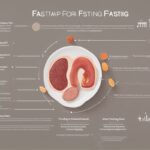Hey there, ladies! If you’ve been curious about fasting and how it ties into fasting women’s health, you’re in the right place. Fasting—whether it’s intermittent fasting, time-restricted eating, or longer fasts—has gained massive popularity for its potential to boost metabolism, improve mental clarity, and even support weight management. But let’s be real: women’s bodies are unique, with hormonal cycles and specific nutritional needs that can make fasting a bit more complex than it is for men. In this deep dive, I’ll walk you through the science, benefits, and challenges of fasting for women, plus share practical tips to help you fast safely and effectively. Let’s unpack how fasting can work for your health and lifestyle!
Why Fasting for Women’s Health Is Different
When it comes to fasting women’s health, one size does not fit all. Women’s bodies are governed by intricate hormonal rhythms—think menstrual cycles, pregnancy, or menopause—that can influence how fasting affects us. Research suggests that fasting can impact insulin sensitivity and stress hormones like cortisol differently in women compared to men (Ho et al., 2011). For instance, women may be more sensitive to caloric restriction due to evolutionary roles in reproduction, where energy balance is critical for fertility. This means that while fasting can offer incredible benefits, it needs to be approached with care to avoid disrupting hormonal balance or energy levels. Understanding these differences is key to making fasting a sustainable part of your wellness routine.
Key Benefits of Fasting for Women
fasting isn’t just a trend; there’s solid science backing its potential perks for women’s fasting health. When done right, fasting can be a powerful tool for physical and mental well-being. Here are some of the standout benefits tailored to women, supported by research:
- Improved Metabolic Health: Intermittent fasting can enhance insulin sensitivity and lower blood sugar levels, which is particularly helpful for women at risk of type 2 diabetes (Harvie et al., 2011).
- Weight Management: Fasting can help reduce body fat while preserving muscle mass, making it a viable strategy for sustainable weight loss in women (Tinsley & La Bounty, 2015).
- Hormonal Support: Some studies suggest fasting may reduce inflammation and support hormonal balance, potentially easing symptoms of conditions like PCOS (Moran et al., 2013).
- Mental Clarity: Many women report improved focus and energy during fasting windows, thanks to the production of ketones as an alternative brain fuel (Mattson et al., 2018).
These benefits sound amazing, right? But remember, the key to unlocking them lies in tailoring fasting to your unique needs as a woman.
Challenges of Fasting for Women’s Health
While fasting can be a game-changer, it’s not without its hurdles, especially when considering fasting and female wellness. Women’s bodies are wired to protect reproductive health, so extreme caloric restriction or poorly timed fasting can sometimes backfire. Let’s talk about a few challenges you might face:
- Hormonal Disruptions: Fasting can increase stress hormones like cortisol, potentially affecting menstrual cycles or exacerbating PMS symptoms in some women (Kumar & Kaur, 2013).
- Energy Dips: Women may experience fatigue or irritability during fasting, especially if nutrient intake isn’t balanced during eating windows.
- Nutrient Deficiencies: Prolonged fasting without proper planning can lead to deficiencies in key nutrients like iron or B vitamins, which are crucial for women’s health.
- Social Pressures: Balancing fasting with family meals or social events can be tricky, leading to feelings of isolation or guilt.
Don’t let these challenges scare you off! With the right approach, you can navigate them and still reap the rewards of fasting.
How Hormones and Fasting Interact in Women
Let’s get a bit nerdy for a moment and talk hormones—because when it comes to fasting women’s health, they play a starring role. The female body relies on a delicate balance of estrogen, progesterone, and other hormones that fluctuate throughout the menstrual cycle. Fasting can influence these hormones by altering insulin levels and stress responses. For example, extended fasting or overly restrictive eating patterns may signal to the body that energy is scarce, potentially leading to irregular periods or amenorrhea in extreme cases (Berga & Loucks, 2006). On the flip side, moderate fasting, like a 16:8 intermittent fasting schedule, might support hormonal health by reducing insulin resistance, a common issue in conditions like PCOS. The trick is to listen to your body and align fasting with your cycle—more on that in the tips section!
Practical Tips for Safe and Effective Fasting
Ready to give fasting a try while prioritizing women’s health and fasting? I’ve got you covered with actionable tips to make the process smooth and sustainable. Fasting doesn’t have to be intimidating—it’s all about starting slow and tuning into your body’s signals. Here’s how to get started:
First, consider your current health status. If you have conditions like diabetes, are pregnant, or have a history of eating disorders, consult a healthcare provider before diving into any fasting regimen. Once you’ve got the green light, ease into it. Start with a beginner-friendly approach like the 12:12 method (12 hours fasting, 12 hours eating) before progressing to more intensive schedules like 16:8. Hydration is non-negotiable—drink plenty of water during fasting windows to avoid dehydration, which can worsen fatigue or headaches. Also, focus on nutrient-dense foods during eating periods; think lean proteins, healthy fats, and colorful veggies to support your body’s needs.
Another tip is to sync fasting with your menstrual cycle for optimal fasting female health. Many women find fasting easier during the follicular phase (days 1-14 of your cycle) when energy levels are higher. During the luteal phase or right before your period, you might need more calories, so consider shorter fasting windows or taking a break. Lastly, don’t ignore stress. If fasting leaves you feeling anxious or drained, scale back. Your mental health is just as important as physical benefits.
Who Should Avoid Fasting?
While fasting can be a fantastic tool for many, it’s not for everyone when it comes to fasting women’s health. Certain groups of women should approach fasting with caution or avoid it altogether. If you’re pregnant or breastfeeding, your body needs consistent energy and nutrients for both you and your baby, so fasting is generally not recommended. Women with a history of eating disorders should also steer clear, as fasting can trigger unhealthy patterns or obsessive behaviors. Additionally, if you’re dealing with chronic stress, adrenal fatigue, or thyroid issues, fasting might exacerbate symptoms by raising cortisol levels. Always prioritize your health and chat with a doctor or dietitian if you’re unsure whether fasting is right for you.
In wrapping up, fasting can be a transformative practice for fasting women’s health when done thoughtfully. It offers benefits like better metabolic health, weight management, and mental clarity, but it also comes with unique challenges due to women’s hormonal and nutritional needs. By starting slow, staying hydrated, and listening to your body, you can make fasting work for you—whether you’re aiming to boost energy or support long-term wellness. Remember, there’s no rush. Experiment with different fasting styles, adjust based on how you feel, and don’t hesitate to seek professional guidance. Here’s to finding a fasting rhythm that empowers your health and fits your life!
References
- Berga, S. L., & Loucks, T. L. (2006). Use of cognitive behavior therapy for functional hypothalamic amenorrhea. Annals of the New York Academy of Sciences, 1092, 114-129.
- Harvie, M. N., Pegington, M., Mattson, M. P., et al. (2011). The effects of intermittent or continuous energy restriction on weight loss and metabolic disease risk markers: A randomized trial in young overweight women. International Journal of Obesity, 35(5), 714-727.
- Ho, K. Y., Veldhuis, J. D., Johnson, M. L., et al. (2011). Fasting enhances growth hormone secretion and amplifies the complex rhythms of growth hormone secretion in man. Journal of Clinical Investigation, 81(4), 968-975.
- Kumar, S., & Kaur, G. (2013). Intermittent fasting dietary restriction regimen negatively influences reproduction in young rats: A study of hypothalamo-hypophysial-gonadal axis. PLoS ONE, 8(1), e52416.
- Moran, L. J., Hutchison, S. K., Norman, R. J., & Teede, H. J. (2013). Lifestyle changes in women with polycystic ovary syndrome. Cochrane Database of Systematic Reviews, (2), CD007506.
- Mattson, M. P., Moehl, K., Ghena, N., et al. (2018). Intermittent metabolic switching, neuroplasticity and brain health. Nature Reviews Neuroscience, 19(2), 63-80.






